- Home
- Elizabeth George
With No One As Witness Page 16
With No One As Witness Read online
Page 16
Fu relaxed into the sight of that car, released and released. It was, He thought, unfortunate that the barrier had been set up at the south end of the tunnel. From this position, the body could not be seen. And He’d taken such pains to make the message clear: The boy doomed himself, don’t you see? Not to retribution, from which there had never once been a realistic hope of escape, but from release. Until the end, the boy had both protested and denied.
Fu had expected to wake from the night with a sense of disquiet, born of the boy’s refusal to admit his shame. True, He hadn’t felt any such sense at the moment of his death, experiencing instead the momentary loosing of the vice that had His brain in its grasp, tighter and tighter with each passing day. But He had assumed He’d feel it later on, when clarity and personal honesty demanded that He evaluate His choice of subject. Yet upon waking He hadn’t felt anything remotely like unease at all. Instead, until the arrival of the maggot, well-being had continued to suffuse Him, like the sense of repletion after a good meal.
“…not releasing any other information at the moment,” the reporter was saying earnestly. “We know there’s a body, we’ve heard—and let me stress that we’ve only heard, and it has not been confirmed—that it’s the body of a boy, and we’ve been told that officers have arrived from the Met police squad already investigating the last murder in St. George’s Gardens. But as to whether this latest killing is related to the earlier murders…We’re going to have to wait for word on that.”
As she spoke, several individuals came out of the tunnel behind her: plainclothes cops by the look of them. A dumpy woman with pudding-basin hair took some direction from a blond officer in an overcoat that had the look of old money about it. She nodded once and headed out of sight, whereupon the officer stood in conversation with a bloke in a mustard anorak and another with concave shoulders and a crumpled mac.
The reporter said, “I’ll just see if I can have a word…,” and advanced as close to the barricade as she could get. But every other reporter had the same idea, and so much jostling and shouting ensued that no one got an answer to anything. The cops ignored the lot of them, but the telly cameraman zoomed in anyway. Fu got a good look at His adversaries. The dumpy woman was gone, but He had time to study Overcoat, Anorak, and Crumpled Mac. He knew He was more than a match for them.
“Five and counting,” He murmured to the television. “Don’t touch that dial.”
Nearby, He had a cup of tea that He’d made upon waking, and He saluted the television with it before He replaced it on a nearby table. Around Him, the house creaked as its pipes supplied the old radiators with water to heat the rooms, and He heard in those creaks an announcement of the maggot’s imminent return.
Look at this, He would instruct as He pointed to the television where the police discussed Him and His handiwork. I leave the message, and they must read. Every step of it planned in exquisite detail.
The stertorous breathing behind Him, then. That eternal signal of the maggot’s presence. Not in His head now, but here in this room.
What’re you doing, boy?
Fu didn’t need to have even a look. The shirt would be white, as it always was, but worn at both the collar and cuffs. The trousers would be charcoal or brown, the tie knotted perfectly and the cardigan buttoned. He’d have polished his shoes, polished his specs, and polished his round bald head as well.
The question again: What’re you doing? with the threat implicit in the tone.
Fu made no reply since the answer was obvious: He was watching the news and experiencing the unfolding of His personal history. He was making His mark, and wasn’t that exactly what He’d been instructed to do?
You best answer me when I speak to you. I asked what’re you doing and I want a reply.
And then, Where the hell were you brought up? Get that teacup off the bloody wood. You want to polish the furniture in your spare time since you’ve got so much of it? What’re you thinking about anyway? Or are you out of practice in that department?
Fu fixed His attention on the television. He could wait him out. He knew what came next because some things were written: bran in warm milk, soaked into slop, a glass of fibre dissolved in juice, those prayers sent heavenward for a quick movement of the bowels so he wouldn’t have to experience said movement in a public place like the gents’ loo at school. And if movement was achieved, a triumphant notation on the calendar hanging inside the cupboard door. R for regular when regular was the last thing a maggot could ever hope to be.
But something was different this morning. Fu could feel him charging, a horseman directly from Revelations.
Saying, Where are they? What’ve you bloody done…I told you to keep your filthy mitts off. Didn’t I say? Didn’t I expressly tell you? You turn off that God damn telly and look at me when I’m talking to you.
He wanted the remote. Fu would not hand it over.
You defying me, Charlene? You defying me?
What if He was? Fu thought. What if she was? What if they were? What if He did? What if everyone did? Amazingly, He found Himself unafraid, wary nevermore, utterly at ease, even a bit amused. The maggot’s power was nothing in comparison with His own now that He’d finally taken it up, and the beauty of it all was that the maggot had no idea who or what he was dealing with. Fu felt such a presence in His veins, such capability, such sureness and knowledge. He rose from the chair, and He allowed His body to come into its fullness, undisguised. He said, “I wanted and I took. That’s what it was.”
Then nothing. Nothing. It was as if the maggot read Fu’s power. He sensed a sea change.
“Good on you,” Fu said to him. Self-preservation tended to gain you very high marks round here.
But the maggot couldn’t leave it completely alone, not when his way of simply being had long been so thoroughly ingrained in him. So he watched Fu’s every move and he waited, eager for an indication that it was safe to speak.
Fu went to put the kettle on to boil. Perhaps, He thought, He would have a whole bloody pot of tea. And He would choose a blend possessing something of a vaguely celebratory air. He studied the boxes of tea in the cupboard. Imperial gunpowder? He thought. Too weak, although He had to admit that He found the name attractive. He settled on one that had been His mother’s favourite: Lady Grey, with its hint of fruit.
And then, What are you doing up? Before nine a.m. the first time in…how long? When’re you planning to do something useful? That’s what I really want to know.
Fu looked up from spooning Lady Grey into the teapot. “No one knows,” he said. “Not you, not anyone.”
That’s what you think? Taking a slash in public, but no one knows? Your name on the charge sheet three or four times and that’s fine, isn’t it? Who’s going to care? And don’t you touch Charlene! Anyone touches the stupid cow, it’s going to be me.
Now they were in familiar territory: the open-palm slapping so as not to leave a mark, the grip on the hair and the head jerked back, the shove into the wall and the kick in places where it wouldn’t show.
Punctured lung, Fu thought. Was that what it was? Saying, You watch, boy. You learn from this.
Fu felt the urge come upon Him, then. His fingertips tingled and the muscles throughout His body made Him ready to strike. But no. The time was not right. When the day came, though, it was going to be such a pleasure to lower the pudgy, soft, never-known-hard-work hands to the pan, to its burning surface. His face hovering above the maggot and His lips hurling the curses this time….
He would beg like all the others. But Fu would not relent. He would take him to the edge, like the others. And just like the others, He would hurl him over.
See my power. Know my name.
DETECTIVE CONSTABLE Barbara Havers made her way over to Borough police station and found it on the High Street, which in this part of town and at this time of morning was funneling commuters through its narrow canyon. The noise level was intense, and the cold air was heavy with diesel exhaust fumes. These were doi
ng their best to deposit even more grime upon the already grimy buildings that sat back from pavements littered with everything from beer cans to condoms limp with use. It was that kind of neighbourhood.
Barbara was beginning to feel the stress. She’d never worked on a serial killing before, and while she’d always known the sensation of urgency attendant on getting to a killer and making an arrest, she’d never actually experienced what she was experiencing now, which was the feeling that she was somehow personally responsible for this latest murder. Five now, with no one held to an accounting. Whatever else, they weren’t working fast enough.
She was finding it difficult to keep her focus on Kimmo Thorne, victim number four. With number five dead and number six out there, somewhere innocently going about his daily affairs, it was all she could do to stay calm as she entered the Borough High Street station and flashed her identification.
She needed to speak to whoever had nabbed a kid called Kimmo Thorne in Bermondsey Market, she told the special. The matter was urgent.
She watched as he placed three telephone calls. He spoke low, keeping his eye upon her and no doubt evaluating her as a representative of New Scotland Yard. She didn’t look the part—disheveled and ill dressed, with all the glamour of a wheelie bin—and this morning she knew she was particularly unkempt. One did not rise before four A.M., spend several hours in the grime of South London, and still manage to swan about looking like the catwalk was in one’s afternoon diary. She’d thought her red high-top trainers had added a cheerful touch to her ensemble. But they seemed to be causing the special constable the most concern, considering the disapproving looks he kept casting in their direction.
She paced over to a notice board and read about community-action committees and neighbourhood watch programmes. She considered adopting two sad-looking dogs whose pictures were posted, and she memorised the phone number of someone willing to sell her the secrets of instant weight loss while allowing her to continue to eat whatever she wanted. She went on to read all about “Taking the Offensive When Walking at Night” and was halfway through this when a door opened and a male voice said, “Constable Havers? You’re wanting me, I believe.” She turned and saw a middle-aged Sikh in the doorway, his turban blindingly white and his dark eyes deeply soulful. He was called DS Gill, he told her. Would she accompany him to the canteen? He’d been having his breakfast, and if she didn’t mind his finishing it…Mushrooms on toast with baked beans. He had become more English than the English, he said.
She took a coffee and a chocolate croissant from the food on offer, eschewing the wiser and decidedly more nutritious possibilities. Why indulge in a virtuous half grapefruit when she was soon to learn the secret of weight loss while continuing to eat whatever she wanted, which was usually something laced with lard? She paid for her goodies and carried them to the table where DS Gill was once again tucking into the breakfast she had interrupted.
He told her that everyone at the Borough High Street station knew about Kimmo Thorne, even if not everyone had met the boy. Kimmo had long been one of those individuals whose doings were never far from the police radar screen. When his aunt and his gran had reported him missing, no one at the station had been surprised, although to have him turn up as a murder victim whose body was dumped in St. George’s Gardens…That had shaken a few of the less hardened officers at the station, making them wonder if they had done enough to try to keep Kimmo on the straight and narrow.
“You see, we quite liked the boy here, Constable Havers,” Gill confided in his pleasant Eastern voice. “My gracious, he was a character, Kimmo: always ready with the chat, whatever his circumstances happened to be. To be honest, it was very difficult not to like him, despite the cross-dressing and soliciting. Although, to be frank, we never actually caught him in the act of soliciting, no matter how we went about it. That boy had such a sense for when someone was undercover…If I may say so, he was streetwise beyond his years, and for that reason we may have fallen derelict in our duty to apprehend him by a more advanced means, which could in turn have saved him. And for this, I personally”—he touched his chest—“do feel responsible.”
“His mate—a bloke called Blinker…one Charlie Burov—says they worked it as a pair across the river. Out of Leicester Square and not round here. Kimmo did the deed while Blinker kept watch.”
“That explains some of it,” Gill noted.
“Some?”
“Well, you see, he was not a stupid boy. We’d had him in for warnings. We tried to tell him time and again that it was only luck that was keeping him out of trouble, but he would not hear us.”
“Kids,” Barbara said. She was trying to be delicate with her croissant, but it was defying her attempts at social nicety, dissolving into delicious flakes that she restrained herself from licking from her fingers, not to mention from the table. “What’re you going to do about them, anyway? They think they’re immortal. Didn’t you?”
“At that age?” Gill shook his head. “I was far too hungry then to think immortality was in store for me, Constable.” He’d finished his breakfast and folded his paper napkin neatly. He placed his plate to one side and brought his cup of tea closer. “For Kimmo, it was more than a sense that he could not be hurt, that he could not fall into danger by making the wrong choice. He had to believe himself an astute judge of whom to go with and whom to refuse because he had plans, and soliciting was a means to make them happen. He could not—and would not—give it up.”
“What sort of plans?”
Gill looked momentarily embarrassed, as if against his will he were about to confide an offensive secret to a lady. “Actually, he wished to have a sexual change. He was saving for that. He told us the first time we had him into the station.”
“A bloke over in the market said you lot finally sent him down for selling stolen goods,” Barbara said. “But what I don’t get is why Kimmo Thorne? There’s got to be dozens over there flogging lumber they’ve nicked.”
“This is true,” Gill said. “But as you and I well know, we do not have the manpower to sort through every stall in every market in London to ascertain which products are legitimately on offer and which are not. In this particular case, however, Kimmo was selling items that—without his knowledge—had all been engraved with infinitesimal serial numbers. And the last thing he expected was to find the owners of the items seeking them out Friday after Friday in the market. When they found him with their belongings for sale, they rang us up directly. I was called out and…” He raised his fingers. The gesture said, The rest is history.
“You’d never twigged before that that he was breaking and entering?”
“He was rather like a canine in that,” Gill said. “He did not foul his own den. When he wished to break the law, he did so in another station’s jurisdiction. He was clever that way.”
Thus, Gill explained, Kimmo’s arrest for selling stolen property went down as his first offence. Because of that, when he went in front of the magistrate, he was put on probation. This too the DS deeply regretted. Had Kimmo Thorne been taken seriously, had he been given more than a slap on the hand and a probation officer in Youth Offenders to report to, he might have changed his ways and still been walking the streets today. But alas, that had not happened. Instead, he’d been sent to an organisation for youth at risk and they’d tried to work with him.
Barbara’s ears pricked up. Organisation? she asked. What? Where?
It was a charity called Colossus, Gill told her. “A fine project, right here, south of the river,” he said. “They offer young people alternatives to street life, crime, and drugs. With recreational programmes, community activities, life-skills classes…And not just for youth at risk with the law, but for the homeless, for truants, for those in care…I admit to having relaxed my own vigilance on Kimmo’s behalf when I knew he had been assigned to Colossus. Surely, I thought, someone there would take him under a protective wing.”
“As a mentor?” Barbara asked. “Is that what they do?�
��
“That’s what he needed,” Gill said. “Someone to take an interest in him. Someone to assist him towards seeing he had a degree of value that he did not quite believe he actually had. Someone to turn to. Someone to…” The DS seemed to bring himself up short, perhaps realising he’d gone from relaying information as an officer of the law to advocating action like a social militant. He loosened the tight grip he had on his teacup.
Small wonder that he was upset by the boy’s death, Barbara thought. With his present mind-set, she wondered not only how long Gill had been a cop but also how he managed to stay one, facing what he had to face at work every day. She said, “It’s not your fault, you know. You did what you could. Fact is, you did more than most cops would’ve done.”
“But as things turned out, I did not do enough. And that is what I must live with now. A boy is dead because Detective Sergeant Gill could not bring himself to do enough.”
“But there are millions of kids like Kimmo,” Barbara protested.
“And most of them are alive at this moment.”
“You can’t help them all. You can’t save each one.”
“That is what we tell ourselves, isn’t it?”
“What else should we tell ourselves?”
“That saving all of them is not required of us. What is required is helping the ones whom we come across. And this, Constable, I failed to do.”
“Bloody hell. Don’t be so hard on yourself.”
“Who else,” he said, “is there to do so? Tell me that if you will. Because here is exactly what I believe: If more of us were hard on ourselves, more children would live lives all children deserve.”
At this, Barbara dropped her gaze from his. She knew she couldn’t argue with that. But the fact that she wanted to do so told her how close she herself was to caring too much. And this, she knew, made her more like Gill than she, as part of the team investigating these crimes, could afford to be.

 Well-Schooled in Murder
Well-Schooled in Murder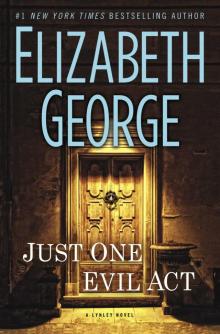 Just One Evil Act
Just One Evil Act This Body of Death
This Body of Death The Edge of the Water
The Edge of the Water For the Sake of Elena
For the Sake of Elena Believing the Lie
Believing the Lie The Edge of the Shadows
The Edge of the Shadows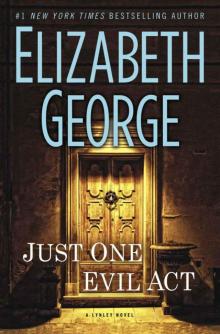 Just One Evil Act: A Lynley Novel
Just One Evil Act: A Lynley Novel In Pursuit of the Proper Sinner
In Pursuit of the Proper Sinner A Moment on the Edge:100 Years of Crime Stories by women
A Moment on the Edge:100 Years of Crime Stories by women Elizabeth I
Elizabeth I I, Richard
I, Richard A Traitor to Memory
A Traitor to Memory Missing Joseph
Missing Joseph A Suitable Vengeance
A Suitable Vengeance Careless in Red
Careless in Red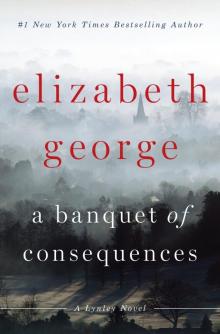 A Banquet of Consequences
A Banquet of Consequences Playing for the Ashes
Playing for the Ashes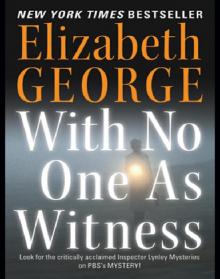 With No One As Witness
With No One As Witness Deception on His Mind
Deception on His Mind The Best American Mystery Stories 2016
The Best American Mystery Stories 2016 A Great Deliverance
A Great Deliverance In the Presence of the Enemy
In the Presence of the Enemy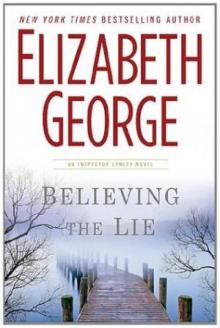 Believing the Lie il-17
Believing the Lie il-17 The Edge of the Light
The Edge of the Light SW01 - The Edge of Nowhere
SW01 - The Edge of Nowhere A Place of Hiding
A Place of Hiding What Came Before He Shot Her il-14
What Came Before He Shot Her il-14 Payment In Blood
Payment In Blood The Punishment She Deserves
The Punishment She Deserves This Body of Death: An Inspector Lynley Novel
This Body of Death: An Inspector Lynley Novel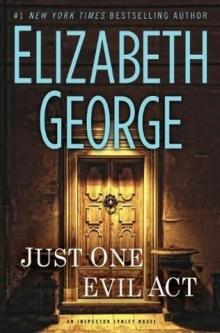 Just One Evil Act il-18
Just One Evil Act il-18 What Came Before He Shot Her
What Came Before He Shot Her Missing Joseph il-6
Missing Joseph il-6